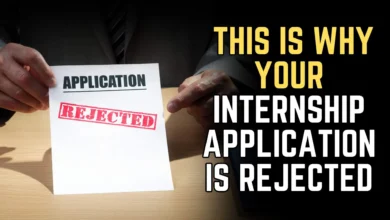The Ultimate Guide to Crafting the Perfect Resume Template for Internship
Resume Template for Internship
Securing an internship is a crucial step in building a successful career. It not only provides valuable experience but also serves as a gateway to full-time employment. However, to land that coveted internship, you first need an impeccable resume. In this article, we’ll walk you through how to create a compelling resume template for internship, tailored specifically for college students, those with no experience, and anyone looking for a free downloadable template. Whether you’re new to the workforce or a seasoned student, this guide will help you create a resume that stands out.

Why You Need a Tailored Resume Template for Internship?
A resume is more than just a list of your qualifications; it’s a marketing tool that sells your skills and experiences to potential employers. When applying for internships, your resume must be concise, targeted, and well-organized. A tailored resume template for internship applications can help you focus on the most relevant information, ensuring that your application stands out in a crowded field.
Key Elements of a Resume Template for Internship
When crafting your resume, certain elements must be included to make it effective:
1. Contact Information:
– Full Name
– Phone Number
– Email Address
– LinkedIn Profile (optional)
– Portfolio or Personal Website (if applicable)
2. Objective Statement:
– A brief, 2-3 sentence summary that highlights your career goals and what you hope to gain from the internship.
– Example: “Motivated college student seeking a summer internship in marketing to apply my communication and analytical skills while gaining hands-on experience in the field.”
3. Education:
– List your current school, major, and expected graduation date.
– Include any relevant coursework, honors, or awards.
4. Skills:
– Highlight both hard and soft skills relevant to the internship.
– Example: Proficient in Microsoft Office, Excel, social media management, excellent communication skills, teamwork, and problem-solving.
5. Experience:
– Include any work experience, even if it’s unrelated to the internship you’re applying for. Focus on transferable skills.
– If you have no formal work experience, include volunteer work, leadership roles in student organizations, or relevant projects.
6. Certifications & Awards:
– List any certifications or awards that enhance your qualifications.
7. Extracurricular Activities:
– Involvement in clubs, sports, or other activities that demonstrate leadership, teamwork, or other relevant skills.
8. References:
– It’s optional to include references, but if you do, make sure they are professional and relevant.
Crafting a Resume Template for Internship for College Students
As a college student, your resume should highlight your academic achievements and any relevant extracurricular activities. Here’s how to structure it:
Contact Information
Make sure your contact information is up-to-date and professional. Use a simple, professional email address (e.g., john.doe@example.com) rather than something casual.
Objective Statement
This should be tailored to the internship you’re applying for. Mention your academic background, the specific skills you want to develop, and how the internship aligns with your career goals.
Education
Focus on your major, relevant coursework, and any academic honors or awards. If you have a strong GPA (generally 3.5 or higher), include it.
Skills
As a college student, you may not have extensive work experience, so emphasize your skills. Include both hard skills (e.g., proficiency in a particular software) and soft skills (e.g., communication, teamwork).
Experience
If you have relevant work experience, great! If not, don’t worry. Focus on internships, part-time jobs, volunteer work, or campus involvement that showcases transferable skills.
Extracurricular Activities
Involvement in student organizations, sports teams, or volunteer work can demonstrate leadership, teamwork, and time management skills.
Creating a Resume Template for Internship with No Experience
If you have no formal work experience, you can still create a strong resume by focusing on your skills, education, and any volunteer work or extracurricular activities.
Focus on Skills and Education
Without work experience, your skills and education will be the centerpiece of your resume. Highlight any relevant coursework, certifications, or skills that align with the internship.
Include Volunteer Work and Extracurricular Activities
Volunteer work and participation in clubs or organizations can demonstrate many of the same skills as paid work experience. Be sure to list any leadership roles or projects you’ve been involved in.
Emphasize Transferable Skills
If you’ve developed skills in other areas (e.g., leadership in a student organization, project management in a group project), highlight them. These are often more important than formal work experience.
Use a Strong Objective Statement
Your objective statement should be tailored to the internship and emphasize your willingness to learn and contribute. Show enthusiasm for the opportunity to gain experience.
Free Resume Template for Internship Download
Creating a resume from scratch can be time-consuming, but the good news is that there are many free resume templates available for download that are specifically designed for internships. Here are a few tips for choosing the right one:
1. Simplicity is Key: Choose a template that is clean and easy to read. Avoid overly elaborate designs that may distract from the content.
2. Customize the Template: While a template provides a great starting point, be sure to customize it to fit your specific experience and the internship you’re applying for.
3. Format Appropriately: Ensure the template you choose is formatted correctly for easy reading. Use bullet points to break up text and make it more digestible.
4. Tailor Your Resume for Each Internship: While a template provides a solid foundation, each resume should be tailored to the specific internship you’re applying for. Customize the objective statement, skills, and experience sections to match the internship’s requirements.
How to Download a Free Resume Template for Internship
There are several online resources where you can find free resume templates. Websites like Canva, Microsoft Word, and Google Docs offer a variety of templates that are easy to customize.
Step-by-Step Guide to Downloading and Customizing a Template:
1. Visit a Template Website: Websites like Canva, Microsoft Word, and Google Docs offer a variety of free templates.
2. Choose a Template: Browse through the options and choose a template that fits your style and the industry you’re targeting.
3. Download the Template: Most templates are available in formats like Word or PDF. Choose the one that best suits your needs.
4. Customize the Template: Open the template in a program like Microsoft Word or Google Docs. Replace the placeholder text with your information, including contact details, objective statement, education, skills, experience, and extracurricular activities.
5. Save and Export: Once you’ve customized your resume, save it as a PDF to ensure that the formatting remains intact when you submit it to employers.
Conclusion
Creating a resume template for an internship doesn’t have to be a daunting task. By following the guidelines outlined in this article, you can craft a resume that highlights your strengths and positions you as an ideal candidate. Whether you’re a college student, have no experience, or are looking for a free template to download, this guide has you covered. Remember, the key to a successful internship resume is to tailor it to the specific position, highlight your most relevant skills and experiences, and keep it concise and well-organized.
In today’s competitive job market, a well-crafted resume is your ticket to securing an internship that can set the stage for your future career. So take the time to create a resume that reflects your unique qualifications and aspirations, and you’ll be well on your way to landing the internship of your dreams.




